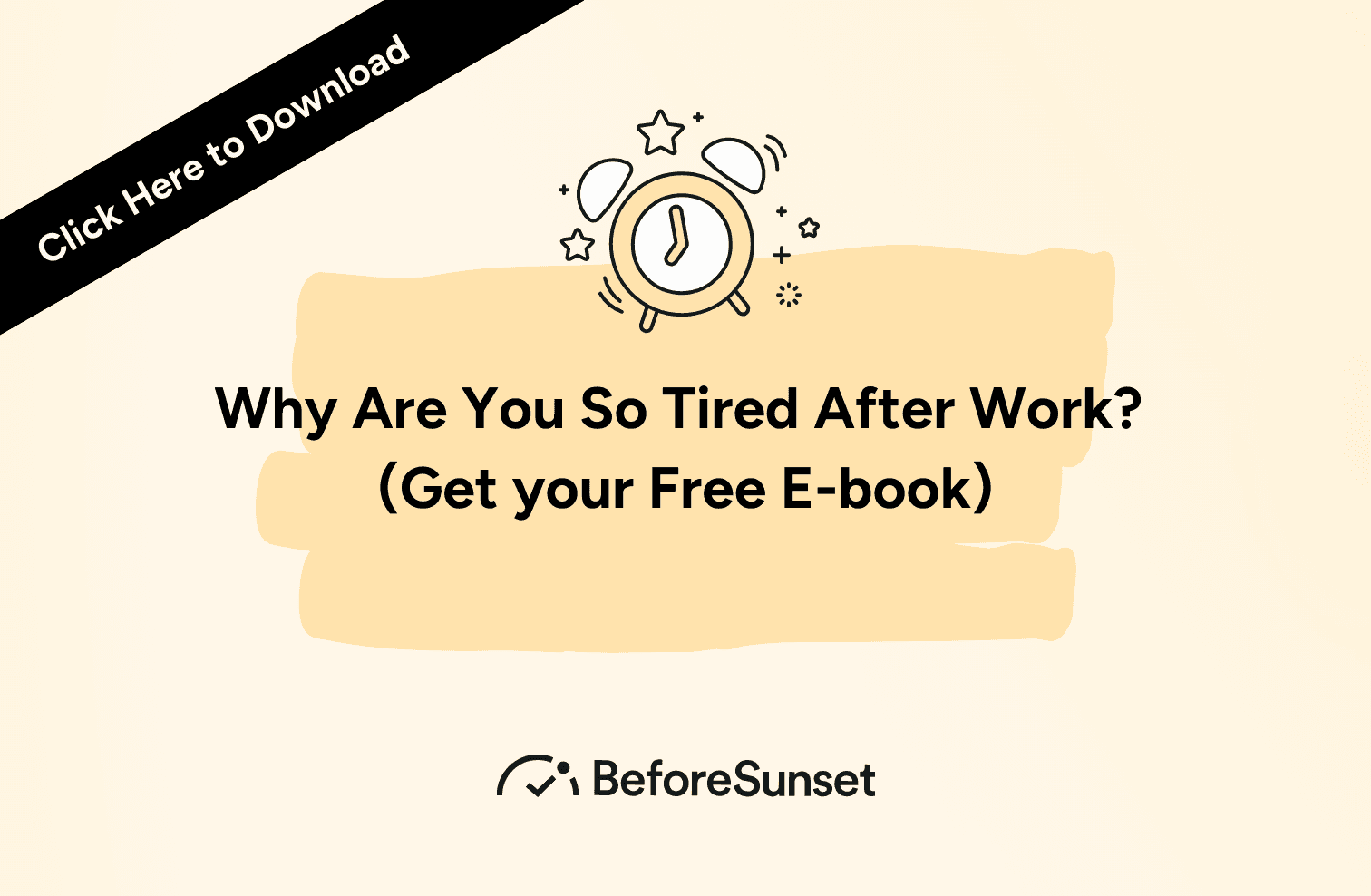Are you curious about the scientific reasons behind feeling tired after work?
If so, you're not alone. Understanding the scientific foundation of exhaustion is critical to tackling the problem and finding effective solutions.
According to Mathias Pessiglione of Pitié-Salpêtrière University in Paris, France, "influential theories indicated that fatigue is a sort of illusion built up by the brain to make us stop whatever we are doing and turn to a more rewarding pastime." "Yet, our findings reveal that cognitive work causes a true functional alteration—the accumulation of noxious substances—so tiredness would be a signal that causes us to stop working, if not for a different reason: to preserve the integrity of brain functioning."
Why Am I So Tired After Work?
Whether you work in an office, a factory, or from home, the demands of the job can take a toll on your energy levels.
But why do we feel so exhausted at the end of the workday, even when we haven't engaged in any vigorous physical activity? Many of us have pondered this perplexing topic, and the solution is not always simple.
Let's go into the fundamental subject of why we feel tired after work and offer concrete advice on how to deal with this all-too-common problem, fatigue, tiredness, feeling drained- you name it.
You may also like:
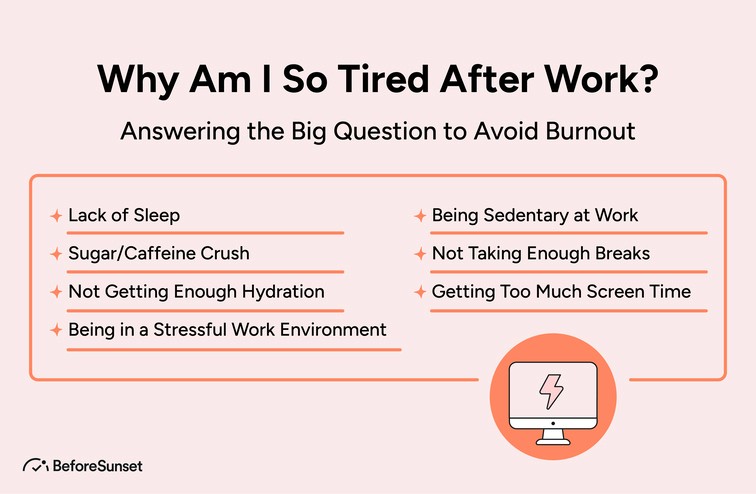
Lack of Sleep
Additionally, staying up late and waking up early disrupts our natural sleep-wake cycle, or circadian rhythm, which can further compound our fatigue. Even if we manage to get a decent amount of sleep, if it's not during the right time for our bodies, we can still feel exhausted. It is especially common for those who work night shifts or have irregular schedules to have work fatigue.
We also have to mention that many unfavorable health impacts, such as an increased risk for obesity, diabetes, and cardiovascular disease, have been linked to long-term sleep loss.
Not Getting Enough Hydration
Unfortunately, many people don't drink enough water throughout the day, especially if they're spending long hours at work or engaged in physical activity.
Our bodies require an adequate amount of water to function properly, and even mild dehydration can lead to feelings of fatigue and lethargy.
Being Sedentary at Work
The detrimental effects of sitting for long durations have been well-documented, yet the modern work culture is primarily sedentary. Muscle stiffness and soreness from sitting for long periods of time can lead to a lack of energy and a sluggish disposition.
Furthermore, prolonged sitting can restrict blood flow, depriving our brains and bodies of oxygen and nutrients necessary for peak performance.
Inactivity might also cause our metabolic rate to decrease, resulting in decreased calorie expenditure and an increase in feelings of lethargy and fatigue. Taking frequent pauses to get up and walk around can help counteract the harmful consequences of sitting for long periods of time.
A healthy metabolism and sustained energy throughout the day are two additional benefits of making exercise part of your regular routine.
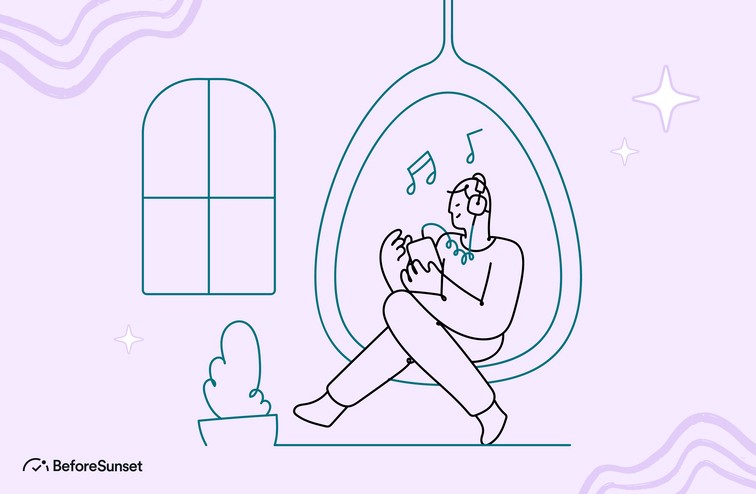
Not Taking Enough Breaks
It's not a surprise to learn that not taking enough breaks actually contributes to feeling tired after work and fatigue. Our minds and bodies become overworked and exhausted if we do not take regular breaks, resulting in lower energy levels and overall productivity.
Being in a Stressful Work Environment
Being mentally and physically exhausted after a long day at work is a common reaction to working in a stressful environment. Cortisol and other stress hormones are released when we're under constant pressure, disrupting our natural sleep cycles and leaving us feeling fatigued.
Furthermore, working in a stressful atmosphere can lead to emotions of worry and overload, making it difficult to rest and unwind after a long day of work.
That is why you should take some time to breath and relax. If you need a guide to regulate your breath you can try Breath Hub. With hundreds of quality sessions you can get help from professionals.
Getting Too Much Screen Time
Globally, people average 6 hours 58 minutes of screen time per day.
As technology has become increasingly a part of our daily lives, many of us have found ourselves spending more and more time in front of screens.
Screen time, whether at work on a computer or at home on a phone or tablet, consumes the lives of many individuals. The blue light from screens can disrupt our circadian rhythms, making it more difficult to go to sleep and stay asleep at night.
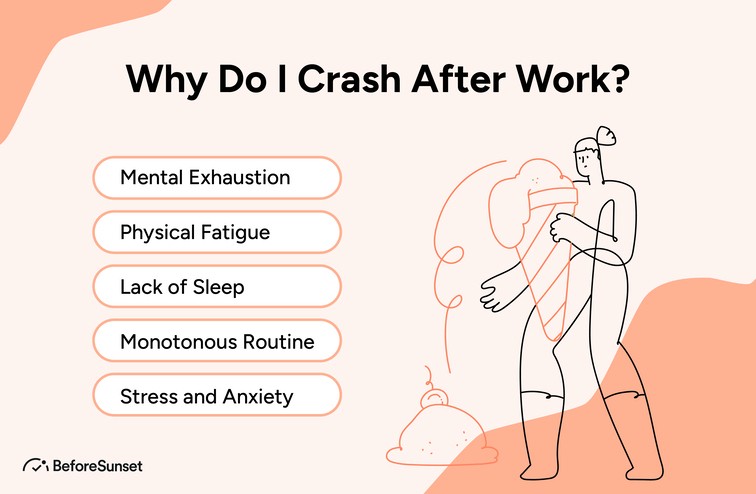
Why Do I Crash After Work?
After-work crashes can be caused by a variety of physical and psychological reasons. Your body could be exhausted at the end of the day if your profession requires demanding physical labor.
On the other hand, intellectually taxing employment combined with decision- and problem-making can result in mental weariness. Anxiety, worry, and lack of sleep all lead to weariness. Your energy might also be depleted by monotonous habits, poor nourishment, and dehydration.
Additionally, prolonged periods of idleness or overwork might wear you out. Prioritize getting enough sleep, have a healthy diet, take frequent breaks, engage in physical exercise, manage stress, and create a relaxing work atmosphere in order to prevent post-work crashes.
Is It Normal To Be Tired Everyday After Work?
Feeling exhausted after work is frequent and might be seen as normal, particularly if you've used a lot of mental or physical energy throughout the course of the day. However, you should consider how exhausted you are and how it affects your general wellbeing.
It's common to feel tired from time to time, especially if your job is demanding or stressful. Most of the time, rest, relaxation, and a good night's sleep will help to alleviate this fatigue. However, if you discover that your post-work weariness causes you to frequently feel exhausted, struggle with daily tasks, or experience mood swings, it may be a sign of a more serious problem that needs to be addressed.
Chronic weariness after work can be caused by a variety of things, such as insufficient sleep, poor diet, excessive stress levels, insufficient physical exercise, and certain medical disorders.
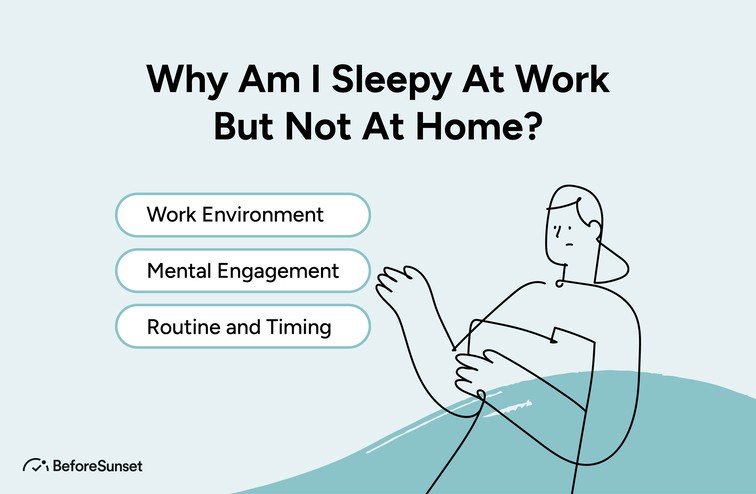
Why Am I Sleepy At Work But Not At Home?
There may be a combination of environmental, psychological, and lifestyle variables at play when you feel weary at work but not at home. A crucial part is played by your body's intrinsic circadian rhythm, a biological clock that controls your sleep-wake cycle. The disruption of this rhythm by work schedules or duties might cause fatigue during working hours. At home, where you have greater control over your activities and relaxation, your body may be more used to being awake.
Your level of attentiveness may be affected by your workplace surroundings. Drowsiness can be exacerbated by dim lighting, unpleasant temperatures, loud noises, and poor air quality at work. On the other hand, your home atmosphere can be more relaxing and alertness-promoting, enabling you to stay awake and focused.
Mental involvement is another element. You're more prone to experience sleepiness if your employment entails mindless, boring, or repetitive duties. You may take part in enjoyable activities at home to keep your mind engaged and avoid getting sleepy.
Fatigue might also result from workplace stress and worry. Your energy may be depleted by the mental pressure of managing deadlines, obligations, and difficulties at work. You could feel relieved and relaxed at home, which will lessen the probability that you'll feel tired.
Another factor to think about is inactivity. If you spend a lot of time sitting down at work, it might limit blood flow and cause muscular exhaustion, which can make you feel sleepy. You may have more possibilities to walk around and be active at home, which might help you feel more alert.
Nutrition and mealtimes are also important. Post-meal tiredness may result from consuming large or unbalanced meals during working hours. Your home eating routine may differ, which would explain your heightened attentiveness.
Additionally, social interactions at work might have an impact on your energy levels. Your attentiveness may improve through interacting with coworkers and taking part in office chats. The lack of these encounters at home may make you feel less drowsy.
Your degree of personal relaxation and comfort at home might also affect your energy. In contrast to a possibly less pleasant work setting, the comfort and familiarity of your own place can aid in keeping you awake and aware.
Why Am I Still Tired After Sleeping 8 Hours?
There are several reasons why someone could feel exhausted even after sleeping for eight hours. An important factor is the quality of sleep; disturbances like sleep apnea or restless legs can prevent sleep from being restorative.
Grogginess may result from sleep cycle interruptions where you awaken in the middle of a deep sleep state. Chronic worry and stress can reduce the quality of your sleep, making you tired. Along with lifestyle elements such a poor diet, low hydration, and irregular sleeping habits, sleep debt acquired from prior insufficient sleep can also be a role.
It's possible that underlying medical ailments like thyroid issues or anemia are at work. Additionally, even with enough sleep, using sleep-related or drowsiness-inducing drugs might make you feel exhausted.
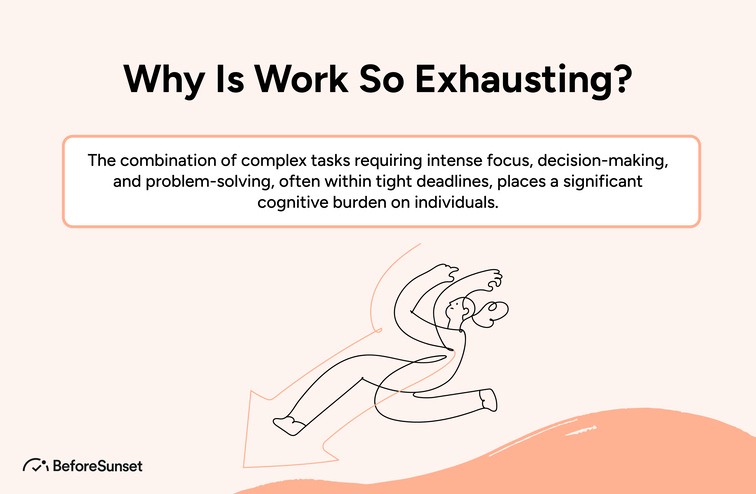
Why Is Work So Exhausting?
The mix of physical, mental, and emotional components that come with work may be draining. Physical tiredness can result from strenuous activities, extended workdays, and repeated actions. Making judgments, finding solutions to issues, and maintaining concentration may tax the mind.
Emotional weariness is a result of emotional elements such as interpersonal conflict, work-related stress, and high-stress circumstances. Additionally, multitasking, constant connectedness, and higher job expectations of the modern workplace can result in chronic stress and burnout.
Lack of breaks, a sedentary work schedule, and juggling these responsibilities with personal obligations may all add to the feeling of tiredness. In order to lessen the damage that work-related tiredness can do, proper stress management, upholding work-life boundaries, taking frequent breaks, and placing a high priority on self-care are necessary.
Is Tiredness A Coping Mechanism?
Although fatigue is not a direct coping method, it can be a side effect of the coping mechanisms and tactics that people use to handle various stresses and difficulties. People utilize coping strategies—behaviors, ideas, or actions—to control or lessen stress, anxiety, or emotional pain. While feeling exhausted is not a coping method in and of itself, several coping mechanisms may subtly promote fatigue.
For instance, while under a lot of stress, a person may engage in avoidance behaviors like procrastination or withdrawal from social situations. These coping mechanisms may heighten mental and emotional stress, which might result in exhaustion. Similar to how drugs like alcohol or some medicines can influence sleep quality and increase feelings of fatigue, these substances can also do so if someone uses them to deal with stress or emotions.
Burnout, which includes emotional depletion and physical fatigue, may be caused by ongoing stress and the excessive use of coping techniques like overworking, persistent worrying, or people-pleasing. In this regard, repeated use of some coping skills might unintentionally increase general fatigue.
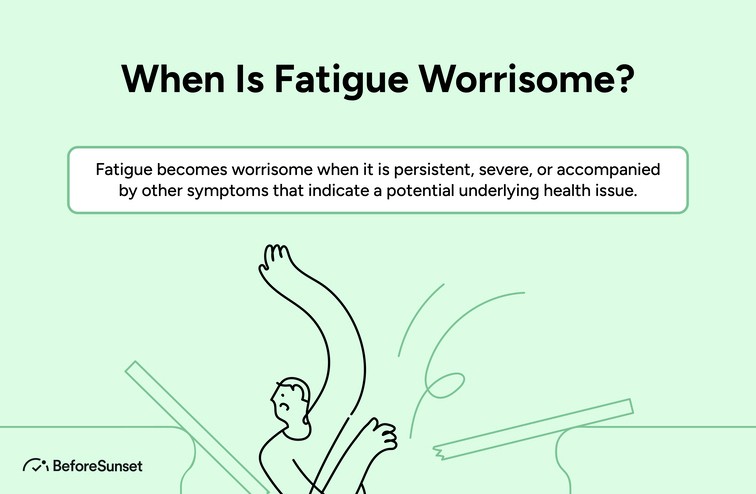
When Is Fatigue Worrisome?
When fatigue lingers for a long time, goes beyond typical exhaustion, or is accompanied by alarming symptoms, it becomes worrying. Chronic fatigue syndrome, anemia, or thyroid disorders may be present if exhaustion persists for weeks without getting better with rest.
An acute infection or disease may be indicated by the sudden onset of weariness, combined with fever, muscular pains, or disorientation. Fatigue and unexplained weight loss may be signs of major diseases like cancer or diabetes.
A heart, lung, or mental health issue may be present if weariness is accompanied by chest discomfort, changes in mental status, or breathlessness. Numerous medical conditions may be indicated by persistent nausea, vomiting, headaches, weakness, chronic pain, or trouble doing everyday duties.
To identify the underlying reason and obtain the necessary care in any of these situations, seeking medical assistance is imperative.
How Do You Know If Your Brain Is Overworked?
A variety of cognitive, emotional, and physical symptoms can be used to determine whether your brain is overworked. Mentally, you can have ongoing trouble focusing, choosing a course of action, or resolving issues.
It may be difficult for you to move between projects, and your creativity and mental clarity may suffer. You could experience emotional irritability, anxiety, or even numbness. Sleep issues, such as trouble falling or staying asleep, may also be a sign of a brain that is overworked.
Physical signs may include eye strain, stiffness in the shoulders and neck, headaches, and a general sense of physical and mental tiredness. Additional indications that your brain may be overloaded include persistent forgetfulness, increased sensitivity to stimuli, and a diminished capacity to handle stress.
To avoid burnout and promote your cognitive well-being, it's critical to recognize these symptoms, practice stress management strategies, take breaks, and partake in relaxing activities.
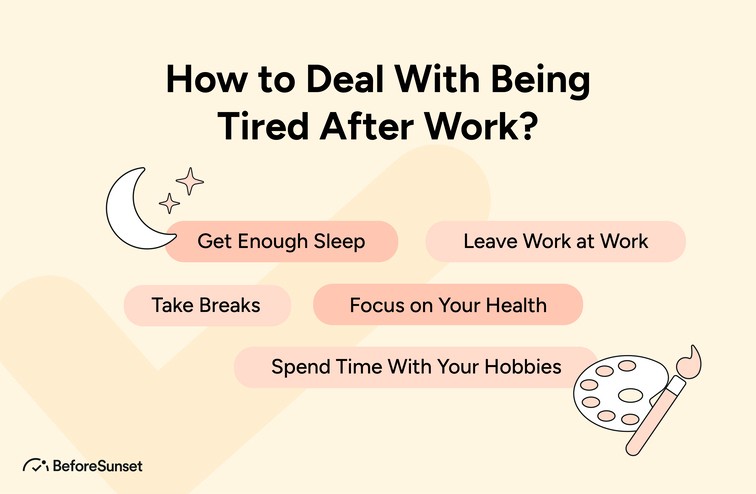
How to Deal With Being Tired After Work?
Before you can effectively tackle fatigue and exhaustion, it's crucial to pinpoint the root cause of the problem. Once you've identified the factors contributing to your feeling tired after work, you can take action with these 5 practical tips to increase your energy levels and improve your overall well-being:
Get Enough Sleep
Leave Work at Work
Spend Time With Your Hobbies
Take Breaks
Focus on Your Health
Or you can try using BeforeSunset AI. What this powerfull software does is that by using AI it plans your day for you. Creating the perfect schedule is one click away. If you plan with ease you will finish work feeling more energized than ever. You can try BeforeSunset AI for free today!
Get Enough Sleep
One of the best ways to avoid feeling tired after work is to get a good night's sleep the night before. Try to implement these tips to your night routine to get some quality sleep:
Get between seven and eight hours of sleep every night.
Stick to a consistent bedtime and wake time.
Develop a calming evening routine
Avoid stimulants like caffeine, alcohol, and nicotine in the hours leading up to bedtime.
Make sure your bedroom is a comfortable temperature and pitch black to eliminate distractions AND enhance the quality of your sleep.
If you make restful sleep a top priority, you'll feel refreshed and ready to take on the challenges of the weekday and the pleasures of the weekend.
Leave Work at Work
When you leave work at work, you're drawing a line between your personal and professional life. Avoid responding to work emails or receiving calls outside of regular business hours. There will be less stress and a better work-life balance as a result of your improved time management.
Try to avoid thinking about work once you leave the office and instead focus on things that will help you relax and refuel, such as physical activity, social interaction, or pursuit of personal interest or a hobby.
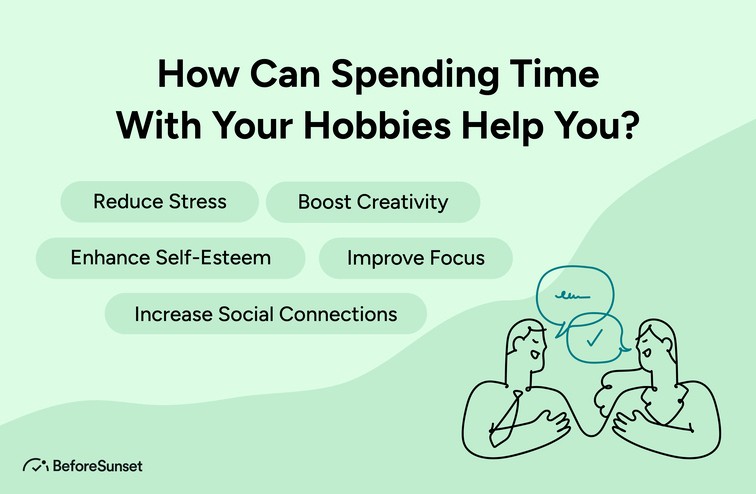
Spend Time With Your Hobbies
Whether it's reading, painting, playing a musical instrument, or gardening, finding time to engage in hobbies can help reduce stress and boost mood.
Hobbies are a great way to relax and unwind away from the pressures of daily life. Time passes quickly and we feel completely immersed in the here and now when we direct our attention toward things that we find rewarding and interesting.
This can be especially useful in warding off exhaustion and feeling tired after work, since it provides a pleasant and productive approach to restore our energy levels.
Take Breaks
Taking a break from your work to do something relaxing like stretching, deep breathing, or going for a brief stroll can do wonders for your mental and physical well-being.
Furthermore, studies have shown that taking breaks can boost concentration and creativity, resulting in improved work performance as taking breaks:
Increases productivity
Improves mental health and well-being
Employees feel more valued by their organization and supervisor if they encourage taking breaks.
Restores focus and attention, especially for long-term goals.
Helps prevent decision fatigue
Improves creativity
Improves job satisfaction
Encourages good behaviors
“Rest” helps consolidate memories and improves learning
To avoid mental fatigue having a balance between your work and personal life is a must.
Focus on Your Health
Another crucial part of dealing with feeling tired after work is to prioritize your health. This covers both physical and emotional health care such as:
Regular exercise,
a balanced and healthy diet,
and time for relaxation and stress-reduction activities such as meditation or yoga.
It's also critical to drink enough of water throughout the day to stay hydrated.
Moreover, if you are having persistent exhaustion or other health issues, don't be afraid to seek medical attention. You can improve your energy levels and overall well-being by prioritizing your health, making it simpler to deal with exhaustion after work.
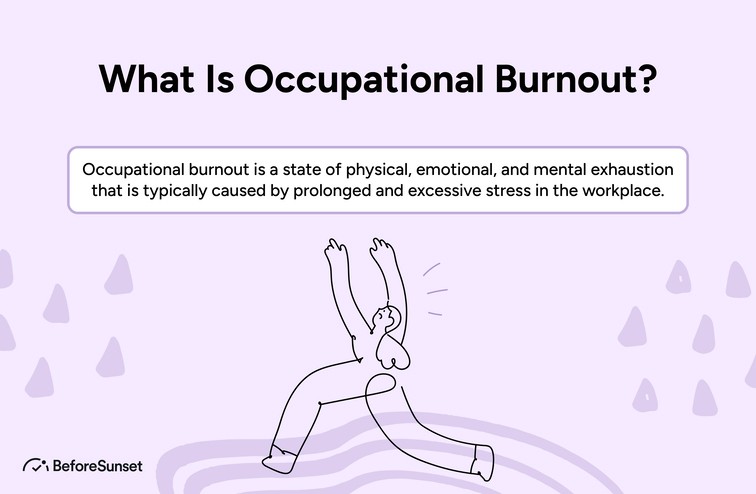
What Is Occupational Burnout?
Occupational burnout, often simply referred to as burnout, is a state of chronic physical and emotional exhaustion caused by excessive and prolonged stress in the workplace. It's characterized by feelings of extreme fatigue, mental detachment from work, and reduced professional efficacy. Burnout typically occurs when the demands of a job consistently outweigh an individual's ability to cope with those demands.
There are three main components that define burnout:
Emotional Exhaustion: This is a feeling of being emotionally drained and overwhelmed. Individuals experiencing emotional exhaustion might feel depleted, lacking the energy to deal with work-related tasks or interpersonal interactions.
Depersonalization: Also known as "cynicism" or "dehumanization," this is when individuals start to distance themselves from their work and colleagues. They might develop a negative and detached attitude, treating people as objects rather than individuals.
Reduced Personal Accomplishment: This component involves a decreased sense of accomplishment and self-efficacy. Individuals might feel that their efforts are in vain and that they're not making a meaningful impact.
Burnout can have serious implications for physical and mental health, as well as for job performance and overall quality of life. It's often linked to increased rates of absenteeism, decreased job satisfaction, and even long-term health problems such as depression, anxiety, and cardiovascular issues.
How Do You Help A Tired Employee?
Empathize with them and provide them with useful assistance if you want to help an exhausted employee. To begin, have an honest and nonjudgmental talk to ascertain the root causes of their exhaustion.
To meet their demands, you may establish flexible work schedules that let people work from home or on their own terms. To lighten their load, evaluate their workload, and assign responsibilities to others. Promote regular breaks and stress the value of maintaining a healthy work-life balance.
Give them access to tools for health and stress management programs and acknowledge their efforts to raise morale.
If their fatigue continues, advise them to consult a doctor. Your ultimate objective is to foster a culture of wellbeing by acknowledging their difficulties and providing them with practical solutions to assist them manage their weariness.
No Longer Tired After Work
Feeling tired after work doesn't have to be an ongoing problem.
You can boost your energy and well-being by figuring out what's dragging you down and doing something about it, including getting more sleep, leaving work at work, picking up a hobby, taking a break, or focusing on your health.
Take care of yourself and make the necessary adjustments to your routine so that you can stop feeling exhausted at the end of the day and actually enjoy your downtime again.
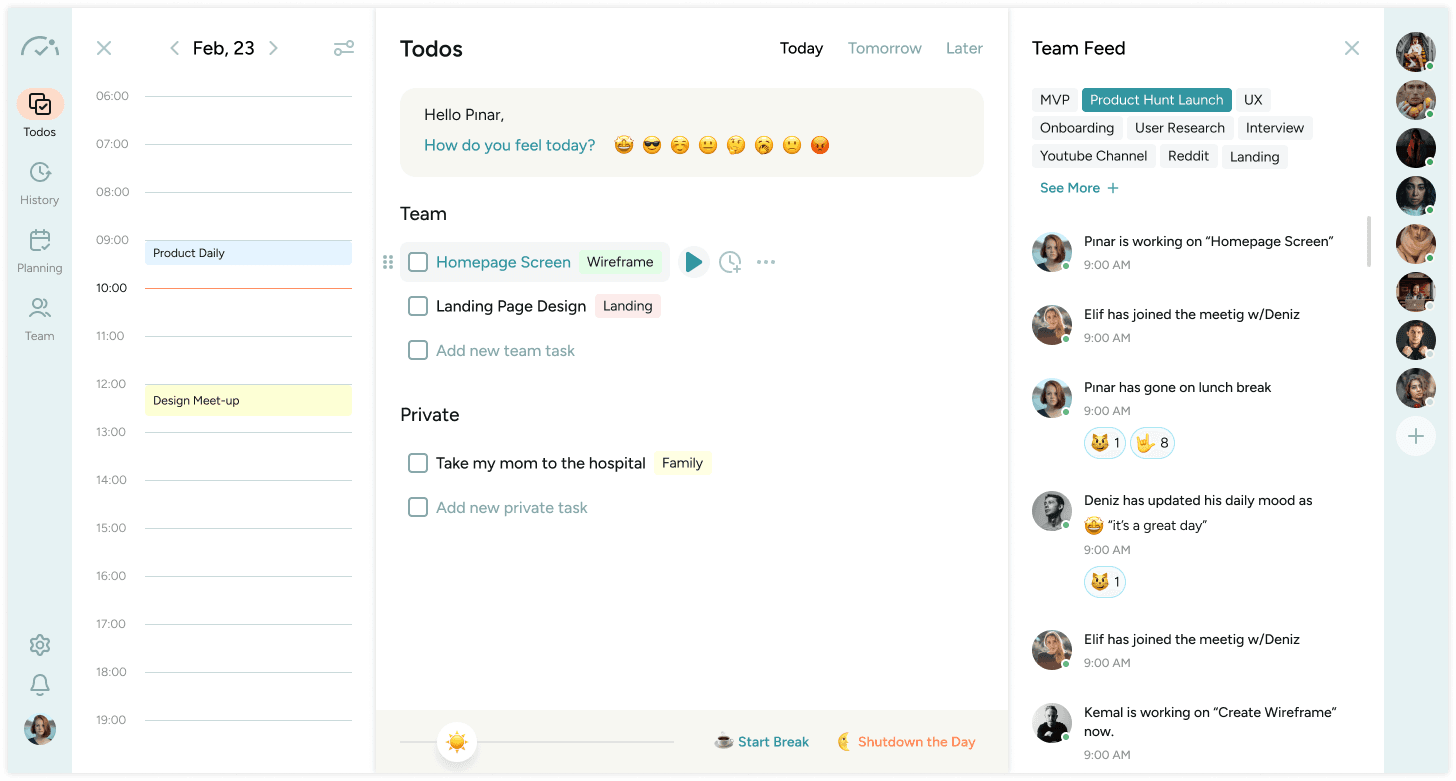
Ways to Prioritize Yourself: BeforeSunset AI
Putting yourself first is not a sign of selfishness. It's crucial to your health and happiness and helps you be the best version of yourself in all aspect of your life.
And you need to learn to be mindful along the way. To practice mindfulness is to pay attention to the here and now without letting thoughts wander. By practicing mindfulness, we can increase our productivity while also reducing stress and improving our overall well-being.
Mindful productivity is about working smarter, not harder. It's about setting realistic goals, prioritizing tasks, and taking breaks when needed to recharge.
So, if you want to boost your productivity and live a more fulfilling life, start by incorporating mindfulness into your daily routine. And you can do that with BeforeSunset AI.
BeforeSunset AI has been designed to help you transform your workday from chaos to clarity. It helps you analyze your yesterday to unwind for a refreshed today.


